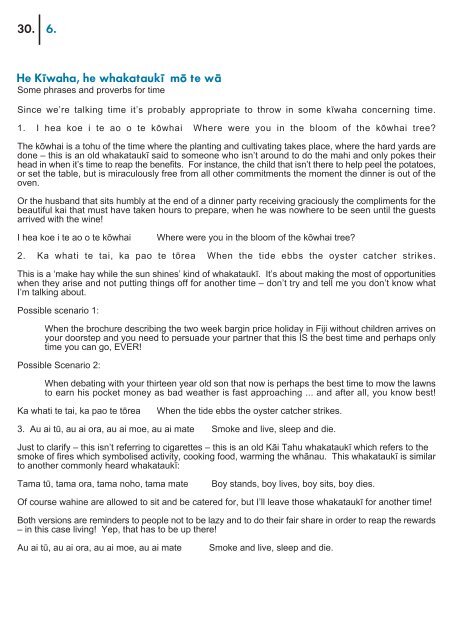You also want an ePaper? Increase the reach of your titles
YUMPU automatically turns print PDFs into web optimized ePapers that Google loves.
30.<br />
6.<br />
Some phrases and proverbs for time<br />
Since we’re talking time it’s probably appropriate to throw in some kïwaha concerning time.<br />
1. I hea koe i te ao o te köwhai Where were you in the bloom of the köwhai tree?<br />
The köwhai is a tohu of the time where the planting and cultivating takes place, where the hard yards are<br />
done – this is an old whakataukï said to someone who isn’t around to do the mahi and only pokes their<br />
head in when it’s time to reap the benefits. For instance, the child that isn’t there to help peel the potatoes,<br />
or set the table, but is miraculously free from all other commitments the moment the dinner is out of the<br />
oven.<br />
Or the husband that sits humbly at the end of a dinner party receiving graciously the compliments for the<br />
beautiful kai that must have taken hours to prepare, when he was nowhere to be seen until the guests<br />
arrived with the wine!<br />
I hea koe i te ao o te köwhai<br />
Where were you in the bloom of the köwhai tree?<br />
2. Ka whati te tai, ka pao te törea When the tide ebbs the oyster catcher strikes.<br />
This is a ‘make hay while the sun shines’ kind of whakataukï. It’s about making the most of opportunities<br />
when they arise and not putting things off for another time – don’t try and tell me you don’t know what<br />
I’m talking about.<br />
Possible scenario 1:<br />
When the brochure describing the two week bargin price holiday in Fiji without children arrives on<br />
your doorstep and you need to persuade your partner that this IS the best time and perhaps only<br />
time you can go, EVER!<br />
Possible Scenario 2:<br />
When debating with your thirteen year old son that now is perhaps the best time to mow the lawns<br />
to earn his pocket money as bad weather is fast approaching ... and after all, you know best!<br />
Ka whati te tai, ka pao te törea<br />
When the tide ebbs the oyster catcher strikes.<br />
3. Au ai tü, au ai ora, au ai moe, au ai mate Smoke and live, sleep and die.<br />
Just to clarify – this isn’t referring to cigarettes – this is an old Käi Tahu whakataukï which refers to the<br />
smoke of fires which symbolised activity, cooking food, warming the whänau. This whakataukï is similar<br />
to another commonly heard whakataukï:<br />
Tama tü, tama ora, tama noho, tama mate<br />
Boy stands, boy lives, boy sits, boy dies.<br />
Of course wahine are allowed to sit and be catered for, but I’ll leave those whakataukï for another time!<br />
Both versions are reminders to people not to be lazy and to do their fair share in order to reap the rewards<br />
– in this case living! Yep, that has to be up there!<br />
Au ai tü, au ai ora, au ai moe, au ai mate<br />
Smoke and live, sleep and die.



